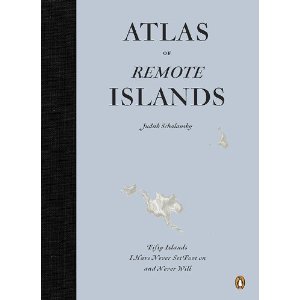Books |
Atlas of Remote Islands (Fifty Islands I Have Never Set Foot on and Never Will)
Judith Schalansky
By
Published: Feb 09, 2017
Category:
Art and Photography
No worries that “Atlas of Remote Islands: Fifty Islands I Have Never Set Foot on and Never Will” will be showing up on gift lists. Though published by Penguin, the biggest recognition the book has received to date is its selection as the German Book Office’s Book of the Month. The author, Judith Schalansky, is a German designer and novelist whose last book was Fraktur Mon Amour, a study of the Nazis’ favorite typeface. [To buy “Atlas of Remote Islands” from Amazon, click here.]
Schalansky got interested in maps and atlases for the most personal of reasons. She was born in East Berlin; when she was 10, East and West Germany merged, “and the country I was born in disappeared from the map.” With that, she lost interest in political maps and became fascinated with the basic building blocks of Earth’s land masses: physical topography.
Fascinating stuff.
Consider: Schalansky sees a finger traveling across a map as “an erotic gesture.”
Consider: Schalansky disdains any island you can easily get to. The more remote the destination, the more enthusiastic she is for it. Like Peter I Island in the Antarctic — until the late 1990s, fewer people had visited it than had set foot on the moon.
Consider: Schalansky believes “the most terrible events have the greatest potential to tell a story” — and “islands make the perfect setting for them.” Thus, the line at the start of the book: “Paradise is an island. So is hell.”
The result? Fifty islands. The world’s loneliest places, in lovely two-page spreads, with geographical information and curious histories on the left, and, on the right, a map of the hapless land mass set on a deceptively peaceful blue background.
Start in the Far North, at Lonely Island, where the average annual temperature is -16 degrees. In the Indian Ocean, on Diego Garcia, is a secretive British military base with a golf course where 500 families once lived. A hundred twenty million crabs begin life on Christmas Island; millions of penguins inhabit Macquarie Island. France tested its hydrogen bomb on Fangataufa, after which no one was allowed to set foot on it for six years. On Pukapuka, there is no word for “virgin.” The Banabas hang their dead from their huts until the flesh disappears; they store the bones under their houses.
And, to give you a sense of Schalansky’s lovely, ironic style as a writer:
St. Kilda, United Kingdom
There are sixteen cottages, three houses and one church in the only village on St. Kilda. The island’s future is written in its graveyard. Its children are all born in good health, but most stop feeding during their fourth, fifth or sixth night. On the seventh day, their palates tighten and their throats constrict, so it becomes impossible to get them to swallow anything. Their muscles twitch and their jaws hang loose. Their eyes grow staring and they yawn a great deal; their mouth stretch in mocking grimaces. Between the seventh and ninth day, two-thirds of the newborn babies die, boys outnumbering girls. Some die sooner, some later: one dies on the fourth day, another not till the twenty-first.
Amsterdam Island, France
Everyone who stays on Amsterdam for longer than a year is examined by a medical officer from the south of France to check that he is coping with the long period of restriction of movement and the confined, purely masculine environment. No woman has visited longer than two days. At night, the men gather in the small video room in Great Skua to watch one of the porn films from their personal collection. Each man sits in a row on his own. The loudspeakers emit grunts and groans, and the air is heavy with the musky scent of the bull seals.
Are these stories true? The author is cagy:
That’s why the question whether these stories are ‘true’ is misleading. Every detail stems from factual sources…however I was the discoverer of the sources, researching them through ancient and rare books, and I have transformed the texts and appropriated them as sailors appropriate the lands they discover.
Transformed? Well, why not — it’s not like you’re booking a ticket to visit any of these places. Just the opposite. Reading in your favorite chair, sipping a cuppa, you can conclude there’s no place like home.


